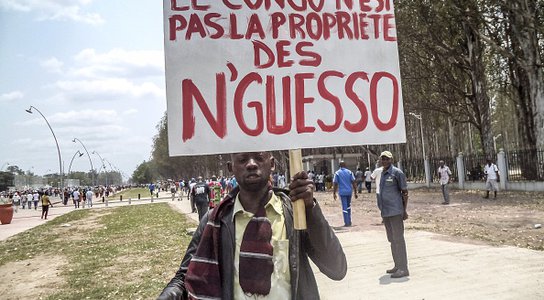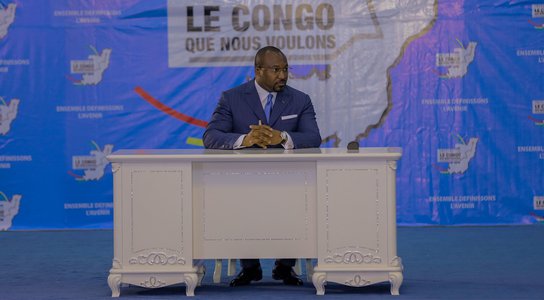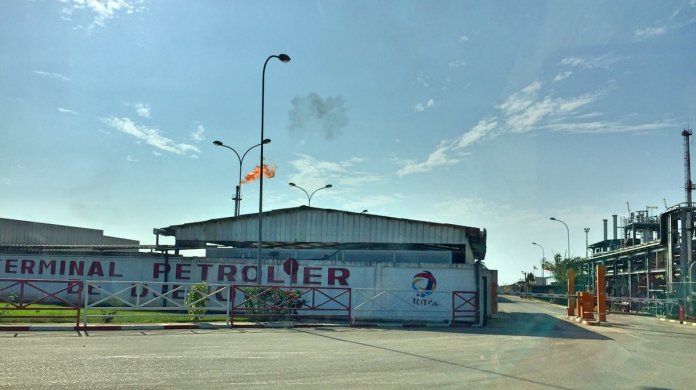
Djeno oil terminal, Republic of Congo. Brazzaville Infos 242 via Facebook
A company linked to Republic of Congo’s presidential family stands to earn almost 6 million euros ($7 million) per year from a new fee on oil tankers in what is suspected to be the family’s latest illicit scheme, Global Witness reveals.
The revelations come months ahead of the 2021 presidential election in which Denis Sassou-Nguesso, incumbent for 36 of the past 41 years, will stand.
In July, we documented how the president’s son, Denis Christel Sassou-Nguesso, allegedly stole millions from Congo’s national oil company, which he used to buy expensive real estate and luxury goods in the US, France and elsewhere. In 2019, we revealed how Denis Christel and his sister Claudia have seemingly laundered and spent up to $70m in stolen state funds.
Congo has oscillated in and out of debt distress since the 1980s, receiving its fourth IMF bailout in 2019. This year’s oil price shock and the Covid-19 pandemic have sent the economy deeper into crisis, straining an already massively under-resourced healthcare system.
A maritime windfall
The company in question this time is Copremar (la Congolaise des prestations maritimes), which is headed and majority-owned by Wilfrid Nguesso, a nephew of President Sassou-Nguesso. Its director in France is Nanette Nadine Sarlabout, a niece-in-law of the president.
Wilfrid, a pastor and pilot by training, has been under investigation in France since 2017 for laundering stolen public funds, the first member of the Sassou-Nguesso family to be targeted in the Ill Gotten Gains (Biens mal acquis) affair. In 2015, a French judge ordered the seizure of two properties in Paris, suspected to have been bought and maintained by Wilfrid with embezzled public funds. In 2013, he was banned from entering Canada where his wife and children were based on the grounds of implication in organised financial crime.
On 20 August 2020, Copremar, which is headquartered in Pointe-Noire, Congo, unilaterally announced to shipping agents that, from 7 September 2020 onwards, all VLCC and Suez Max tankers loading at Congo’s Djeno oil terminal will be charged a new “safety watch fee” of 69,500 euros (almost $84,000), according to a document seen by Global Witness.
In September 2020, Copremar took over towing operations at the Djeno terminal, replacing French oil major Total, the terminal’s overall operator, Copremar informed Global Witness. This award was made during negotiations between Total and the Congolese government for the former to renew its terminal operating licence, which expired on 17 November 2020, and prompted the announcement of the new “safety watch fee”.
Copremar’s fee appears to be well above the norm for such a service, according to three independent shipping experts consulted by Global Witness. It is between six and nine times more expensive than the safety watch fee at the nearby Pointe-Noire port, according to Global Witness estimates based on available data (see note 3).
On average, seven tankers per month loaded at Djeno from October 2014 to October 2020, according to data on vessel movements from Refinitiv Eikon, indicating that Copremar stands to earn up to 5.84 million euros ($7.06 million) per year from this fee.
Copremar has a monopoly over towing operations at Djeno, meaning companies have no choice but to go with their services and price if they want to dock tankers to load crude oil, Congo’s primary export product.
In response to questions from Global Witness, the lawyer representing Copremar and Sarlabout – who has also represented the Republic of Congo – said that the company does not charge a fee “between six and nine times higher” than other providers, and that the size of the fee is “fully justified” by the services provided, which are of a high technical and human resource quality. Unlike other providers, Copremar’s security provision offers three boats instead of one, and the boats are of a higher quality, the lawyer said. Copremar is the sole company capable of providing such services, takes great care to respect the law and the trust of its clients, and acts in full transparency, the lawyer added.
Contradicting Copremar’s account, Total informed Global Witness that its Congo subsidiary TEP Congo has never been involved in towing operations or “safety watch”. Total further said that it had no authority over Copremar’s decision to levy the safety watch fee and no direct knowledge of who had authorised Copremar to do so. Copremar claimed its licence was granted by the Port Autonome of Pointe-Noire, but provided no evidence to support this claim.
Global Witness contacted Wilfrid Nguesso via his lawyers, but did not receive a response.
Déjà-vu?
Copremar has much in common with Socotram, Wilfrid Nguesso’s primary vehicle for embezzlement of public funds according to French and Canadian judges.
Copremar and Socotram share a parent company (World Global Shipping – see graphic below), beneficial owners (Wilfrid and his wife), directors (Wilfrid and Sarlabout) and an address in Paris.
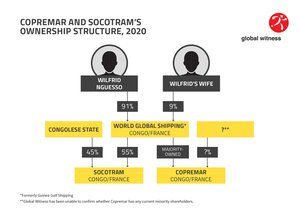
Socotram’s role in Congo’s maritime oil sector has been questioned by Global Witness and Congolese civil society for decades. Since being founded in Congo in 1990, the minority state-owned entity has collected millions of dollars’ worth of maritime taxes that never make it to the Treasury, according to Extractive Industries Transparency Initiative (EITI) reports. Ship-owners pay these taxes to Socotram then bill them to oil companies, which are in turn reimbursed by the state. This means that the state loses out twice from Wilfrid’s profiteering: through lost tax revenue and the cost of reimbursement. In effect, the state is paying the very taxes destined for its Treasury to a private company owned by a member of the presidential family.
In January, we revealed how oil companies were being reimbursed by Congo for a vast range of costs, including the school fees of their executives’ children and signature bonuses destined for the state – and in some cases even earning interest on these. Socotram’s maritime tax can be added to that list, contributing to ballooning public debt at a time of acute economic crisis.
Global Witness has been unable to verify whether or not Copremar’s fee will be reimbursed by the state, like Socotram’s maritime tax. We wrote to Congo’s transport and merchant navy ministry and to the Pointe-Noire port authorities, which according to Copremar issued its licence, but did not receive a response.
Total informed Global Witness that the cost of the fee is not re-invoiced to TEP Congo and therefore cannot be recovered by TEP Congo from the state.
Socotram did not respond to Global Witness’s request for comment.
All roads lead to Europe
European jurisdictions and companies are a core part of Copremar and Socotram’s business model.
Both Copremar and Socotram demand payment in euros. Both have an active branch in France where their ultimate owner, Wilfrid Nguesso, has been under investigation for money laundering since 2017. Both share a French parent company – World Global Shipping, previously registered as Guinea Gulf Shipping in Luxembourg and then Cyprus. Until late 2018, Copremar was part-owned by France’s Bourbon Corporation and the Swiss-Dutch Riverlake Solutions.
Bourbon told Global Witness that it first took steps to divest its interest in Copremar in September 2018, a process that wasn’t finalised until 2020 due to “commercial and administrative hurdles”, and that it therefore has no knowledge of or information on the new safety watch fee.
Riverlake, which first responded to Global Witness’s request for comment with an email that simply read “Copremar… Trouble :(”, went on to explain that “Congolese interests” took over Riverlake’s participation in Copremar in September 2018 and that they could not therefore comment on the safety watch fee.
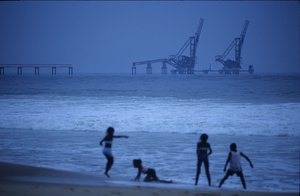
The recent oil price shock and Covid-19 pandemic have sent Congo's already struggling economy deeper into crisis, straining its under-resourced healthcare system. Veronique Durruty via Getty Images
Our investigation suggests that Copremar’s fee is the latest manifestation of Wilfrid Nguesso’s profiteering in Congo’s maritime oil sector and yet another example of the presidential family’s abuse of power.
The case exhibits multiple red flags for corruption, including:
- A company owned and run by multiple members of Congo’s presidential family, otherwise known as “politically-exposed persons” (PEPs), one of whom – Wilfrid – is under investigation for money laundering in France and banned from Canada on charges of organised financial crime
- That company has a similar corporate structure to Wilfrid’s primary vehicle for embezzlement, Socotram. Its parent company, now based in France, has changed jurisdiction multiple times since incorporation in 2001, jumping from one European secrecy jurisdiction to another as money laundering investigations evolve
- That company introduces an apparently inflated fee in a monopoly market months ahead of a presidential election and amid licence negotiations between Total and the Congolese government
Global Witness is calling upon the Congolese and French authorities to investigate Wilfrid Nguesso, Copremar, Socotram and the legitimacy of their operations.
That two large companies – the French Bourbon and the Swiss-Dutch Riverlake – were content to go into business with Wilfrid Nguesso, despite his record and connections, highlights a severe culture of corporate impunity in Europe. This case provides a clear example of why the European Commission must include corruption risks in the forthcoming EU law on corporate due diligence.
Notes to Editors
- Bourbon Corporation, formerly listed on Euronext Paris, was taken over by Société Phocéenne de Participation in January 2020, according to its website, and in April 2020 put into liquidation by a decision of the Marseille Commercial Court. The company and eight of its staff are facing trial for corruption of foreign public officials, principally in Cameroon, Equatorial Guinea and Nigeria, after its then finance director was caught with a suitcase full of cash at Marseille airport. In February 2020, the trial was deferred for procedural irregularities.
- According to Congo’s government gazette, Copremar received authorization from the transport, civil aviation and merchant navy minister to tow and moor ships in August 2018 for six months, with the option to renew just once. We have found no evidence of a licence renewal or issuance. In response to questions from Global Witness, Copremar said that the Port Autonome of Pointe-Noire issued its towing licence, but provided no evidence of this. The port did not respond to our request for comment.
- The safety watch fee at Pointe-Noire port is 163 to 245 euros per hour, according to official port rates published on a World Food Programme logistics platform. Pointe-Noire has an average dock waiting time of “just under 24 hours”. A rough day rate would therefore be 3,912 to 5,880 euros. Djeno, with its one-off fee of 69,500 euros, has an average dock waiting time of approximately two days (or 48 hours), according to Refinitiv Eikon data. An equivalent rough day rate would therefore be 34,750 euros. This makes Djeno’s safety watch fee between six and nine times more expensive than that of Pointe-Noire.
Update: Global Witness sought Copremar’s response to the allegations prior to publication and incorporated these in the above article. On 5 January 2021, Copremar further requested that we publish a statement from them as follows:
“COPREMAR wishes to recall that it respects Congolese law and international trade law, and that the company operates with rigour and professionalism. The prices charged reflect the quality of the human and technical services provided, and are not taxes or bonuses or other any practices alleged to result from imaginary offences. COPREMAR has three ships, which can be dispatched together or independently in order to optimize each operation according to the tankers in question. COPREMAR would like to recall that its invoicing is the direct financial compensation for its safety watch operations, and that the amount strictly reflects the quality of these services. Finally, COPREMAR wishes to affirm that it always has and always will operate in a transparent and exemplary manner.”
